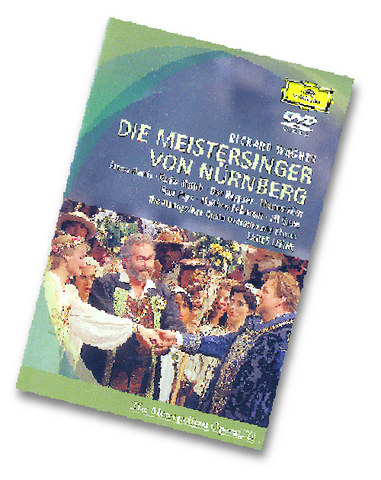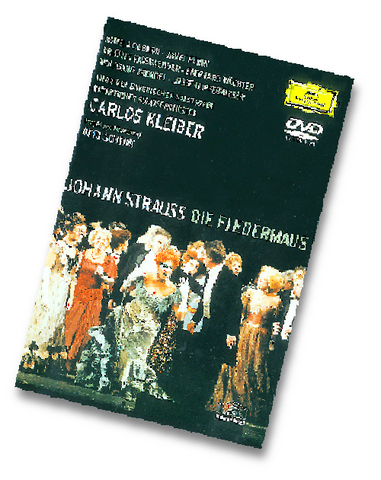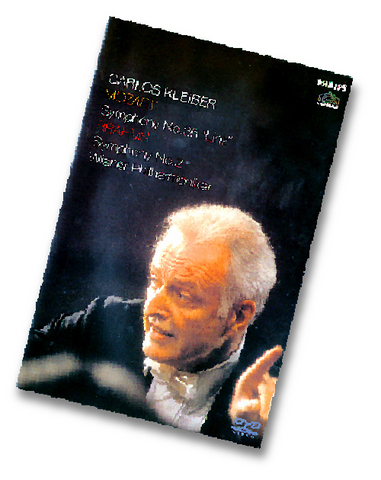The last few years have seen the appearance of a range of opera DVDs, many very fine. But few can compare with the extraordinary new Die Meistersinger von Nurnberg from The Metropolitan Opera, New York, in a performance dating from 2001. Watching something like this really can change your life.
Richard Wagner's Meistersinger is the greatest example in European culture of the Romantic era's fascination with the Middle Ages. It's a benign dream of social harmony before the arrival of what Marx termed the "cash nexus." It also displays Protestant Germany in its many facets, art with its roots in nature, and the creative process everywhere. Wagner without Meistersinger is heroic, dynamic and very frequently overwhelming, but with it he becomes incontestably congenial as well.

James Levine, with a smile both benign and ecstatic, conjures up wonders from the Metropolitan orchestra, the true stars of this 2001 production -- the vorspiele, played in the hushed dark, are glories in themselves. But when the curtain goes up on the beautiful sets (which for Act Two gets instant applause) and the soloists begin their long tasks, enjoyment only increases. This is an opera about music itself and here music of the highest order is given a treatment that avoids all temptations to be surprising or incongruous, but is offered instead in a naturalistic style the composer would surely have been delighted with.

Few will complain about the colorful crowd scenes, but for me it was the more introspective ones -- Act One, and Act Three, Scene One -- that were most telling. The latter in particular is beautiful beyond belief, culminating in a Quintet where the looks on the singers' faces tell even more than their entranced voices convey.
Surprisingly, the soloists are in some ways inappropriate to their roles. Walther is too large, Eva and David insufficiently young, Sacks possibly past his peak as a singer, and so on. But with the inspiration at such a high level it really doesn't matter. And this is typical of opera -- the potential musical rewards are so huge that audiences have always been prepared to make allowances. The fat lady -- not in evidence here -- was always welcome if she alone could give expression to the full splendor of the score.

James Morris as Sachs, wise and sympathetic in a way Wagner's enemies have never been able to credit, leads an all-star cast. Ben Heppner makes a marvelous Walther, puzzled and diffident even while remaining vocally thrilling. Rene Pape is a sympathetic Pogner, while Karita Mattila overcomes all obstacles to create a compelling Eva. High marks, too, for Matthew Polenzani's good-natured David and Jill Grove's genial Magdalene. But the acting prize must go to Thomas Allen whose Beckmesser -- trotting, wincing, flashing false smiles -- would be Oscar material if this were a Hollywood film. But these days opera singers on DVD really do need to be near-flawless -- never before have their performances been recorded for posterity in such detail.

All in all, humanity is the hallmark of this magnificent production, as manifest in the warm yet ringing orchestral playing as in the conviction and contentment radiated by the singers.
The avalanche of recent DVDs featuring the late Carlos Kleiber as conductor includes a 1987 version of Johann Strauss' operetta Die Fledermaus from the Bavarian State Opera. The bottom-pinching absurdities of bourgeois high jinks are at the heart of this alcoholic confection, replete with head-spinning waltzes, a frantic polka and endless jokes about hangovers and delirium tremens. It may have some memorable tunes, but after Meistersinger it's like a mosquito's whine after a lion's roar. Sexual repression is at the heart of it, of course. Nevertheless, if you like the frivolous music and can tolerate the sight of the middle classes at play, you'll have no complaints about this high-spirited and colorful production.
Kleiber is rather more in the camera's eye in a 1991 concert from Vienna's Musikverein. He paints the score with his hands and body, emoting to the music rather than being content to mark the beat, and this suits the DVD medium well. Mozart's Linz and Brahms's second symphonies are featured, with sumptuous sound to match the opulent surroundings. No period instruments are in evidence, but with the great Vienna Philharmonic no such gambits are necessary. The concert is marginally less striking than the one featuring Brahms' Fourth (reviewed in Taipei Times, Dec. 5, 2004), but is very fine nonetheless. In addition, the unlimited opportunities DVD gives to re-watch any section offers a spectacular opportunity to get to know these wonderful scores painlessly and in detail.
But DVD has another virtue -- it helps your ears accustom themselves to strange sounds as well. Tan Dun first heard stone-drumming (knocking stones together), leaf-blowing and other Miao music skills in the village of Xiangxi in China's Hunan province. To these he added a solo cello and Western symphony orchestra to produce his concerto The Map, commissioned by Yo-yo Ma and the Boston Symphony Orchestra. After repeating the work with the Shanghai Symphony and cellist Anssi Karttunen, he decided to take the whole thing down to Hunan (involving three days' travel overland), and perform it in the village that gave it birth. This DVD gives the performance that resulted, on a stage built over the local river, plus a film of almost equal length containing Tan Dun's account of the process, chats with the locals, archive footage and so on.
It's legitimate to wonder how much the villagers really enjoyed this strange music, but DVD watchers are in a better position to get acquainted with it. Once again, the format proves enjoyable and educatiional in almost equal measure.

Most heroes are remembered for the battles they fought. Taiwan’s Black Bat Squadron is remembered for flying into Chinese airspace 838 times between 1953 and 1967, and for the 148 men whose sacrifice bought the intelligence that kept Taiwan secure. Two-thirds of the squadron died carrying out missions most people wouldn’t learn about for another 40 years. The squadron lost 15 aircraft and 148 crew members over those 14 years, making it the deadliest unit in Taiwan’s military history by casualty rate. They flew at night, often at low altitudes, straight into some of the most heavily defended airspace in Asia.

Beijing’s ironic, abusive tantrums aimed at Japan since Japanese Prime Minister Sanae Takaichi publicly stated that a Taiwan contingency would be an existential crisis for Japan, have revealed for all the world to see that the People’s Republic of China (PRC) lusts after Okinawa. We all owe Takaichi a debt of thanks for getting the PRC to make that public. The PRC and its netizens, taking their cue from the Chinese Communist Party (CCP), are presenting Okinawa by mirroring the claims about Taiwan. Official PRC propaganda organs began to wax lyrical about Okinawa’s “unsettled status” beginning last month. A Global

Taiwan’s democracy is at risk. Be very alarmed. This is not a drill. The current constitutional crisis progressed slowly, then suddenly. Political tensions, partisan hostility and emotions are all running high right when cool heads and calm negotiation are most needed. Oxford defines brinkmanship as: “The art or practice of pursuing a dangerous policy to the limits of safety before stopping, especially in politics.” It says the term comes from a quote from a 1956 Cold War interview with then-American Secretary of State John Foster Dulles, when he said: ‘The ability to get to the verge without getting into the war is

Like much in the world today, theater has experienced major disruptions over the six years since COVID-19. The pandemic, the war in Ukraine and social media have created a new normal of geopolitical and information uncertainty, and the performing arts are not immune to these effects. “Ten years ago people wanted to come to the theater to engage with important issues, but now the Internet allows them to engage with those issues powerfully and immediately,” said Faith Tan, programming director of the Esplanade in Singapore, speaking last week in Japan. “One reaction to unpredictability has been a renewed emphasis on